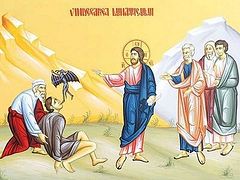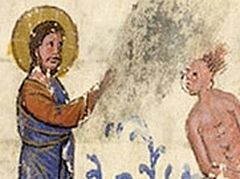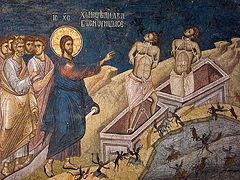In the name of the Father, the Son, and the Holy Spirit. Amen.
Today in the Gospel reading we hear the story about the Gadarene demoniac from which our Lord Jesus Christ cast out the legion of demons. In the Gospel there are many places, which at an attentive, thoughtful reading seem nevertheless difficult to understand. Why does man when addressing God, Christ Himself, the incarnation of grace, goodness, and omnipotent divine help, say to Him: “Do not torment me.” And how many of those people around us experience torment and suffering while living in this world redeemed by our Savior’s podvig on the Cross. Why does this happen? Why do people fall into the abyss of destruction? Why does the main meaning of this life, which consists in people’s striving for communion with God, unnoticeably depart from them, and their lives dissolve into all manner of emptiness and vanity? What are the boundaries of the devil’s influence on the crown of God’s creation—man? Under what circumstances can the evil demon arm himself with all his fury and multitudinous deceits to enslave a man like us, deprive him of his garments of incorruption, and make him like this demoniac who did not wear clothes or live in a house but in tombs, deprived of his father’s protection—to bring a living man to the tombs? How should we understand the words of the apostle Paul, who calls the devil the ruler of this world? The apostle Paul says, For we wrestle not against flesh and blood, but against principalities, against power, against the rulers of the darkness of this world, against spiritual wickedness in high places (Eph. 6:12).
The Lord calls the devils rulers of this world, according to the words of St. John Chrysostom, not because they are to rule the world, to uphold it with his right hand as does God, but because they are the true cause of all evil deeds. Scripture usually calls sinful deeds “the world”. For example, in the words of our Lord Jesus Christ, ye are not of this world (Jn. 15:19), just as I am not of this world, (Jn. 8:23) is written in the Gospel of John. Other holy fathers mean by the word “world” the conglomerate of the passions.
St. Paisius of Mt. Athos noticed very subtly that today the worldly spirit has become our greatest enemy. In our era in the world, much that is worldly has entered, very much of the “spirit of this world”. This worldly spirit is destroying the world. Having received into ourselves this world, having become worldly within, people have cast Christ out of their souls. Those whose hearts are given over to the vain and worldly live under the rule of the ruler of this age. That is, the devil rules vanity and that those who are enslaved to vanity, enslaved to the spirit of this world—the world in the patristic sense.
The heart that is captive to this vain world keeps its soul in a state of underdevelopment, and the mind in darkness. Then a man only seems to be a man; in essence he is really a kind of spiritual premature infant, defective, the living dead, buried alive like the Gadarene demoniac in the many graves where he abides. What is this graveyard of corpses? Many of us are familiar with them, and not only by hearsay. On these graves the shadows verily walk of those who consider their goal in this earthly existence to be insane entertainments, sacrificing to them their abilities and talents; those who steal from their own selves the most precious time that God gives us for achieving lofty things, unreasonably squandering it, wandering through absolutely unnecessary information, which only scatters the mind and casts his inner world into chaos. This today is the mightiest generator of the spirit of this world. The demon, which is called the man-hater and destroyer, doesn’t consider it so important to destroy us physically as he did the herd of swine in Gadara as to draw our immortal souls into the darkness of this age.
We recall one very interesting, edifying incident. A certain woman who lived in Russia in the 1990s became very interested in television. In those days we were inundated with the contents of a thrown-open Pandora’s box—a huge amount of various programs. They were unnecessary, empty, vulgar, preaching violence and depravity, and bringing into the masses this spirit of the vanity of this world. So she watched the television and was particularly drawn to programs about psychics and healers; it was very interesting to her and she tried not to miss a single evening of it. Then suddenly and unexpectedly she learned that she was stricken with a very serious illness. She found out that she had cancer, and this cancer had penetrated her spinal cord, bringing her unbearable pain. Then she went personally to one of those healers, she found an opportunity to go to him and said, “Do whatever you need to do to heal me of this illness and escape this terrible suffering. He said, “Alright, I’ll help you, only I have one condition. I will write a note and put it in a sealed envelope. When you feel pain, place it on your spine and the pain will go away.” She did as he instructed, and the pain really did subside. But then a worse catastrophe befell her. She felt such emotional heaviness and depression, such meaningless in life that the thought came to her more and more often of suicide. Then she asked a Christian friend who was fortunately the spiritual child of Archimandrite Kirill (Pavlov). This person helped her to get to see Fr. Kirill, and Fr. Kirill said to her, “My dear, let’s have a look at what’s in the envelope.” “No!” she said. “Under no circumstances! That healer told me that as soon as I open the envelope I’ll die.” He said, “Alright, let’s do this. As a priest and confessor I promise you that if anyone dies it will be me. I will take that punishment upon myself.” When they opened the envelope they saw the note on which was written, “Satan, help her while she lives in this life, but her soul is yours.”
This frightful story tells us that through foolishness, through superstitious belief a person can become the devil’s victim, become enslaved to him; and who knows what would have happened to that woman if the merciful Lord had not led her to this elder of God.
The apostle says, But God Who is rich in mercy, for his great love wherewith he loved us, even when we were dead in sins hah quickened us together with Christ, (by grace ye are saved) (Ephesians 2:4–5). Let us not forget these significant words, brothers and sisters. Let us be attentive to the words of Holy Scripture. Heeding the psalmist and prophet David, who spoke by the Holy Spirit, Why do you look after vain things and seek falsehood? (Ps. 4:3) in the holy Psalter, let us flee the spirit of this world, the spirit of darkness of this age and cling with all our hearts and souls and all our strength to the All Holy Spirit of God. Amen.





